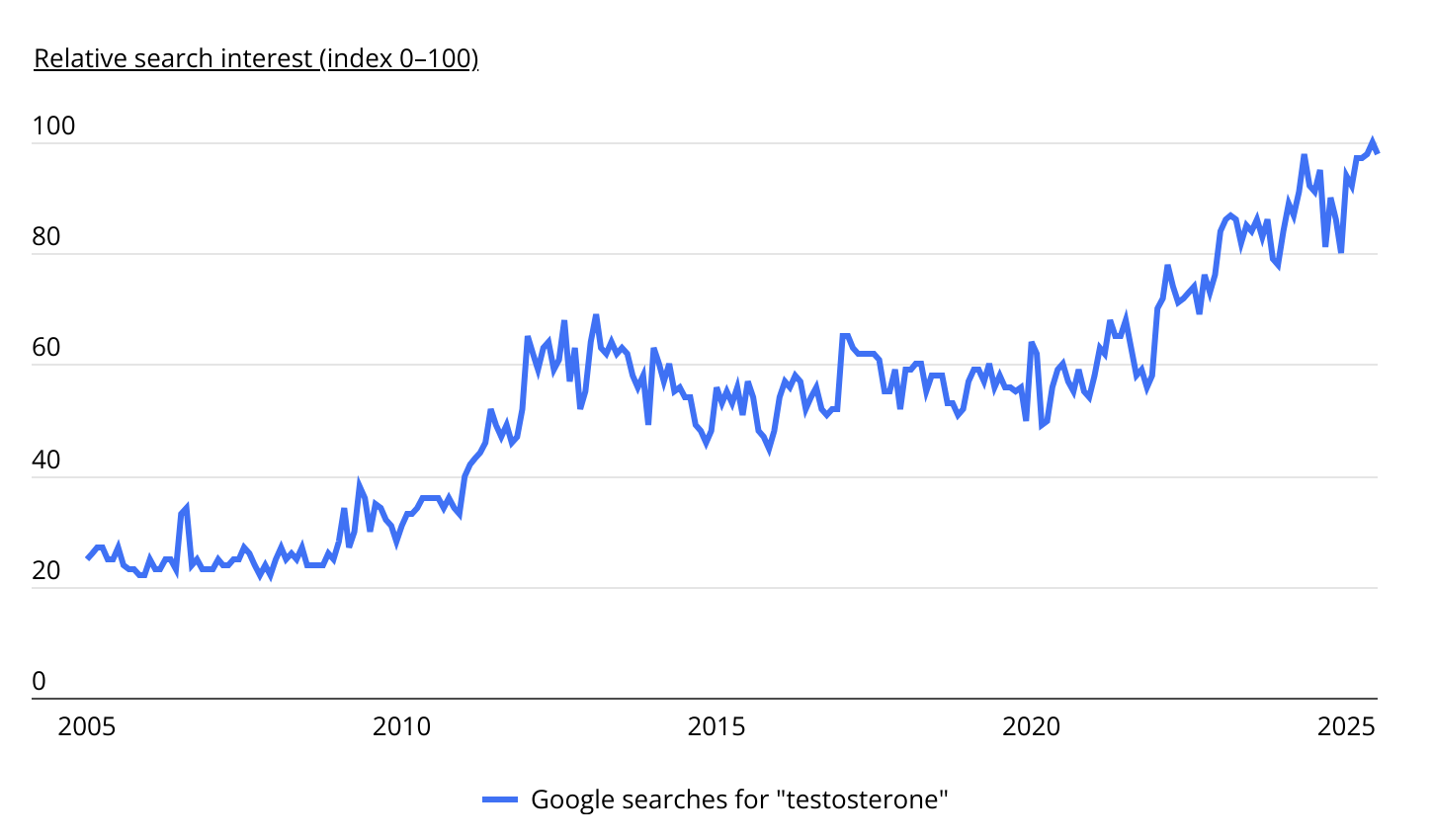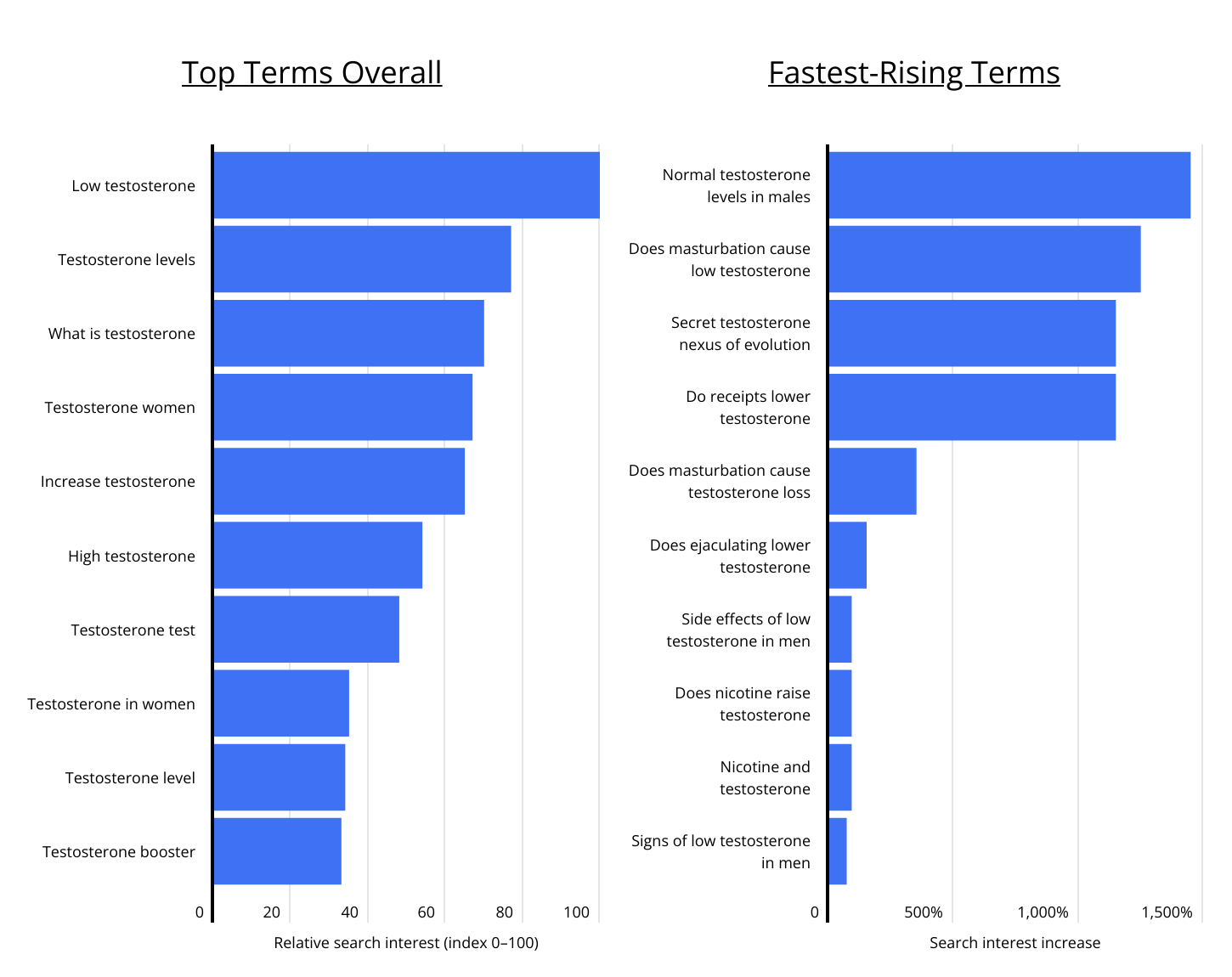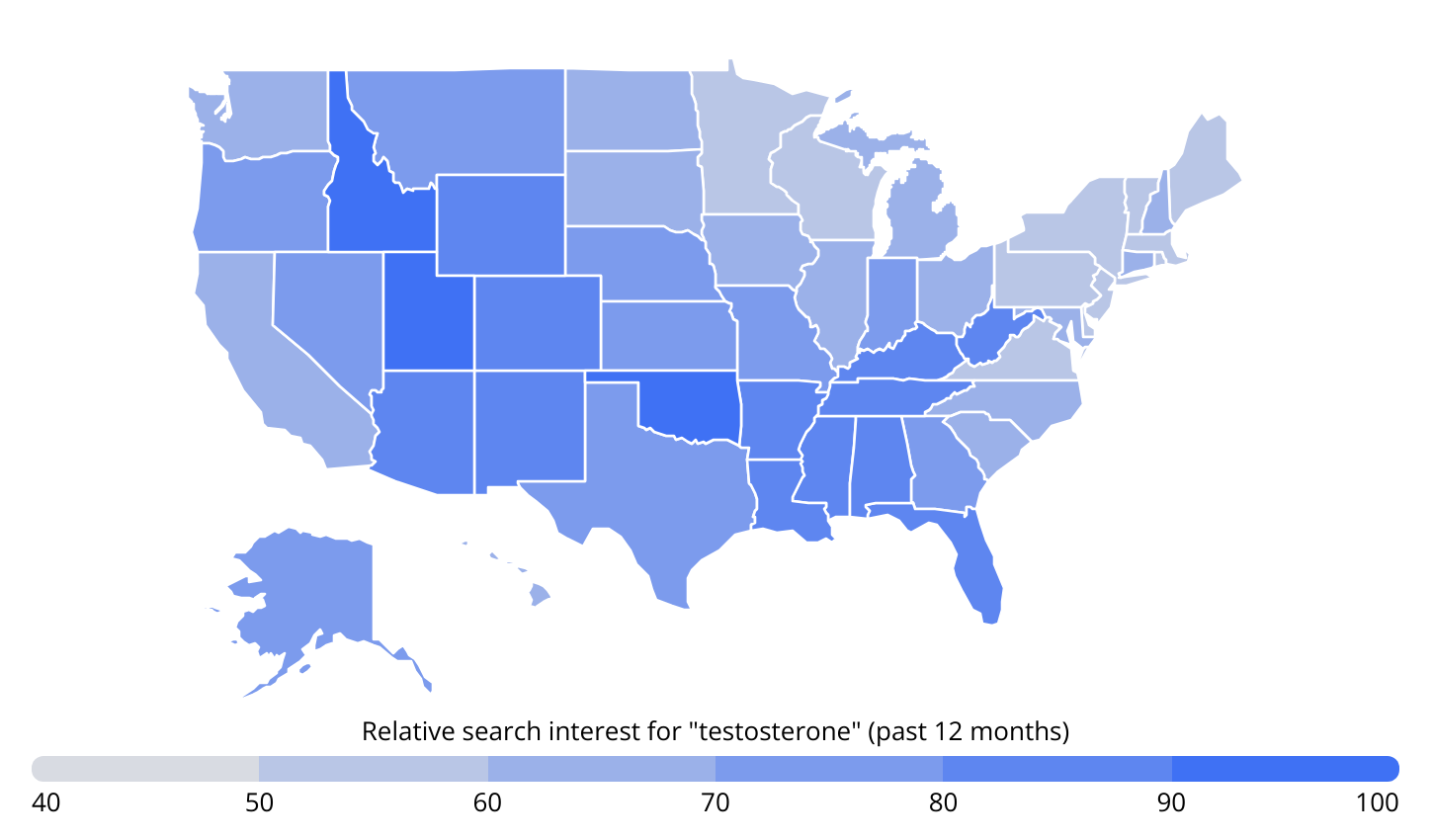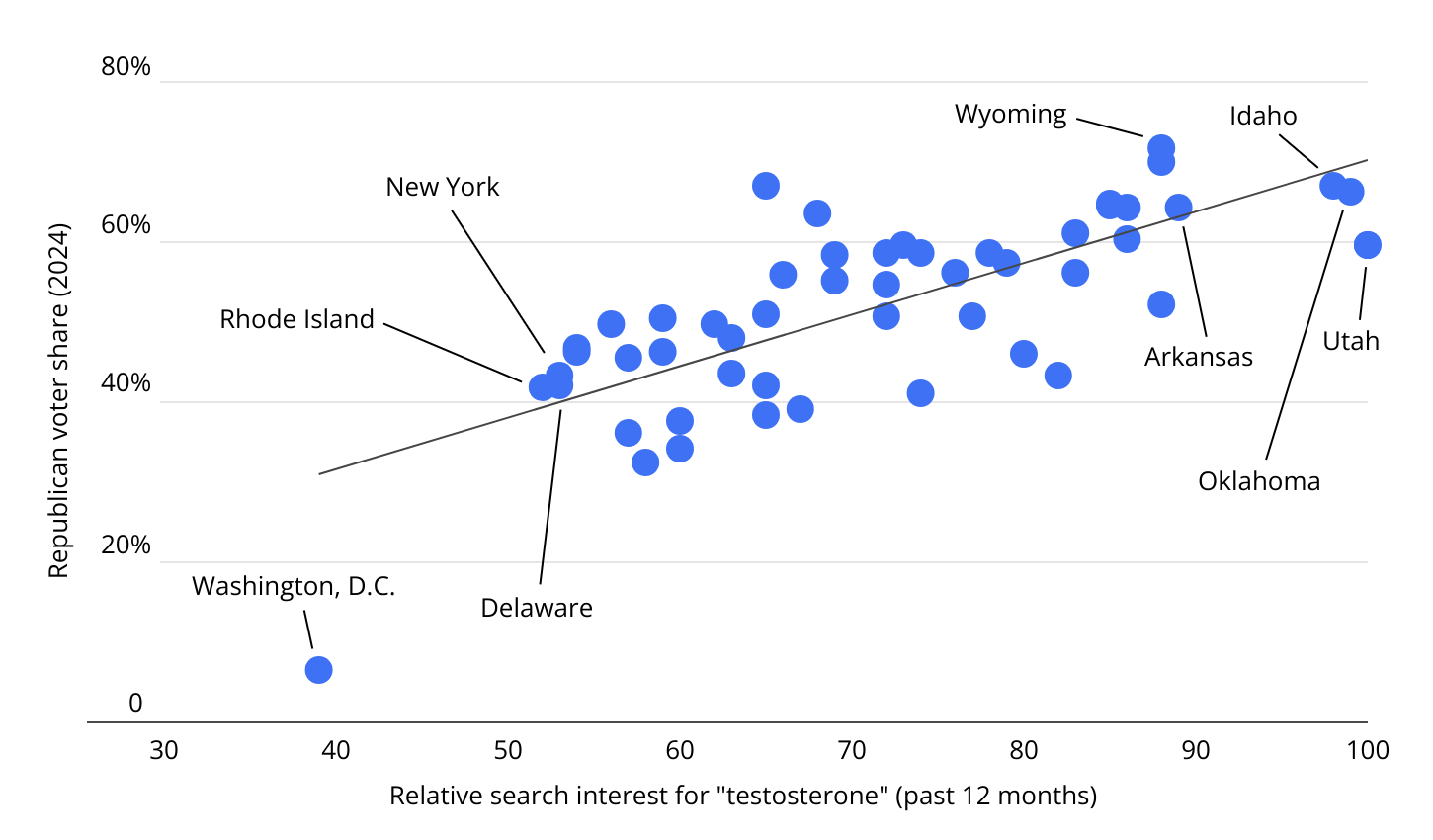Interest in testosterone has surged in recent years, driven by a mix of medical, cultural, and commercial influences. As awareness of age-related hormone changes grows, more people—particularly men—are turning to testosterone as a potential remedy for symptoms like fatigue, low libido, and reduced muscle mass.
While testosterone therapy is FDA-approved for treating clinically diagnosed deficiencies, its use for age-related declines remains off-label. Even so, demand continues to grow, reflected in rising prescriptions and a booming market of over-the-counter supplements, wellness clinics, and online platforms promoting treatment for what’s commonly known as “low T.”
To better understand how this interest is evolving, Invigor Medical—a telehealth company focused on the wellness space—analyzed search data from Google Trends to identify patterns in public curiosity about testosterone. The analysis examines how rapidly search interest is growing, the specific questions and concerns Americans are most frequently researching, and which states are leading the surge in online interest. Additionally, the report explores how political affiliation might influence testosterone-related search behavior.
Here are some of the key findings from the report:
- Testosterone-related search interest is at an all-time high, nearly doubling since 2015 and peaking in June 2025—driven by rising awareness, expanded telemedicine access, and online wellness trends.
- Southern and Mountain West states lead the nation in testosterone search interest, with Utah, Oklahoma, and Idaho topping the list. Meanwhile, areas like DC, Rhode Island, Delaware, and New York show much lower testosterone search activity.
- There is a strong correlation between testosterone search activity and Republican voter share: each of the top five states voted nearly 60% Republican in the 2024 presidential election, while bottom-ranked states saw some of the lowest Republican voter shares.
- Google data shows growing curiosity about both clinical and speculative topics, from “normal testosterone levels in men,” to viral searches fueled by social media such as “do receipts lower testosterone.”
- Searches related to testosterone and women are also rising, reflecting broader interest beyond traditional male-focused discussions.
How Fast Is Interest in Testosterone Growing?

Source: Invigor Medical analysis of Google Trends data
Public interest in testosterone surged in the early 2010s, with Google search volume peaking in early 2013. This period aligned with a sharp rise in prescriptions and growing awareness of low testosterone among middle-aged men, fueled by direct-to-consumer advertising and the expansion of hormone clinics. A 2013 Journal of the American Medical Association study found that testosterone use in the U.S. tripled between 2001 and 2011.
Interest declined in 2014, coinciding with an FDA warning about potential cardiovascular risks linked to testosterone therapy and a mandate for updated product labeling. In the years that followed, testosterone-related searches remained largely stagnant.
That trend began to reverse around 2020. The COVID-19 pandemic sparked renewed focus on personal health, while the rapid expansion of telemedicine made hormone treatments more accessible. At the same time, health and fitness influencers on social media platforms began promoting testosterone optimization as part of broader wellness and longevity routines, further raising public interest. And in 2025, the FDA revised labeling requirements again, citing findings from the TRAVERSE trial, which found no significant increase in major cardiovascular events among men with clinically diagnosed low testosterone.
As a result, search interest climbed rapidly during this period, reaching an all-time high in June 2025—nearly double the levels seen a decade earlier.
What About Testosterone Do Americans Want to Know?

Source: Invigor Medical analysis of Google Trends data
Google search data shows that Americans are seeking answers to a wide range of testosterone-related questions—especially related to symptoms, causes, and how the hormone functions in both men and women.
Over the past year, the most searched term by far was “low testosterone,” followed by related queries such as “testosterone levels,” “what is testosterone,” and “testosterone women.” Interest in how to “increase testosterone” also ranked highly, suggesting a strong public focus on diagnosis, treatment, and hormone optimization. Notably, there was considerable interest in how testosterone affects women, with terms like “testosterone women” and “testosterone in women” both appearing in the top 10.
The fastest-rising searches highlight a mix of practical health concerns and viral curiosity. Searches like “normal testosterone levels in males” (+1,450%) and “side effects of low testosterone in men” (+90%) reflect a desire for medically grounded information. At the same time, highly searched questions such as “does masturbation cause low testosterone” (+1,250%) and “do receipts lower testosterone” (+1,150%) reflect the influence of online health myths and social media speculation. One of the more unusual breakout terms—“secret testosterone nexus of evolution” (+1,150%)—likely refers to an online guide by the same name.
Together, these searches reflect a blend of medically grounded questions—such as those about hormone levels and symptoms—and more speculative or unverified claims that have gained traction through social media, podcasts, and other online wellness content.
Which States Are Most Interested in Testosterone?

Source: Invigor Medical analysis of Google Trends data
Despite a national uptick in interest around testosterone, search activity is not evenly distributed—it’s heavily concentrated in the South, Mountain West, and Appalachia. States like Utah, Oklahoma, Idaho, Arkansas, and Wyoming top the list for testosterone-related search interest. Others with high interest include West Virginia, Arizona, Tennessee, and Louisiana, reflecting a clear regional pattern.
Interestingly, many of these high-ranking states also lean strongly Republican. For example, each of the top five states voted at least 59% Republican in the 2024 presidential election. At the opposite end of the spectrum, states with the lowest testosterone search interest include Washington, D.C., Rhode Island, Delaware, and New York—all of which had some of the lowest Republican vote shares. In fact, the correlation between testosterone search activity and Republican voter share is strong (r = 0.74), suggesting that political leanings are intertwined with the topic.
Testosterone Search Interest Compared to Republican Voter Share

Source: Invigor Medical analysis of Google Trends data
There are several possible explanations behind this trend. In many conservative-leaning areas, there has been a renewed emphasis on traditional masculinity, strength, and vitality—values often promoted by fitness influencers, podcasters, and online wellness brands. Testosterone is frequently marketed as a tool for enhancing muscle mass, energy, libido, and overall male performance, which may resonate more in regions where these ideals are culturally reinforced. Additionally, the growth of telemedicine and direct-to-consumer health platforms has made testosterone treatments more accessible in rural and suburban markets, where healthcare options are sometimes limited and more residents seek out health information online.
Despite these regional and political differences, not a single state—including D.C.—has seen a decline in testosterone-related internet searches over the past decade. Across all states, interest in testosterone is clearly on the rise.
Here is a summary of the data for Arizona:
- Relative search interest (past year): 88
- 10-year percentage change: +97.9%
- Fastest-rising related search term (past year): Side effects of low testosterone in men
For more information, a detailed methodology, and complete results, see Low T & High Interest: The States Searching Most for Testosterone Help on Invigor Medical.







(0) comments
Welcome to the discussion.
Log In
Keep it Clean. Please avoid obscene, vulgar, lewd, racist or sexually-oriented language.
PLEASE TURN OFF YOUR CAPS LOCK.
Don't Threaten. Threats of harming another person will not be tolerated.
Be Truthful. Don't knowingly lie about anyone or anything.
Be Nice. No racism, sexism or any sort of -ism that is degrading to another person.
Be Proactive. Use the 'Report' link on each comment to let us know of abusive posts.
Share with Us. We'd love to hear eyewitness accounts, the history behind an article.